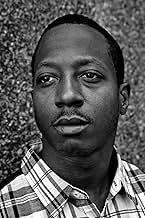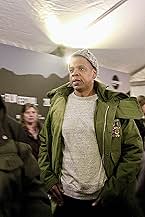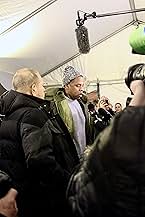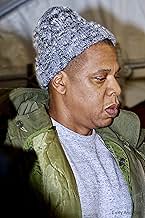Ajouter une intrigue dans votre langueAfter his arrest at age 16, Kalief Browder fought the system and prevailed, despite unthinkable circumstances. He became an American hero.After his arrest at age 16, Kalief Browder fought the system and prevailed, despite unthinkable circumstances. He became an American hero.After his arrest at age 16, Kalief Browder fought the system and prevailed, despite unthinkable circumstances. He became an American hero.
- Récompenses
- 2 victoires et 2 nominations au total
Parcourir les épisodes
Avis à la une
Let me preface this by saying I'm somewhat of a junkie for stories like this. I enjoy empathising with people who've suffered, and the reality check that it gives me that there's so much to be grateful for.
This was a terrible ordeal and another in a long line of quite astonishing relics of this kind during this racially divided era.
However, I score it a 5 because of the appalling decision to drag this out like they did. As others have posted, this could probably have been a 2-part series; 3 at the most (it's 6 episodes in reality). Very tedious.
This was a terrible ordeal and another in a long line of quite astonishing relics of this kind during this racially divided era.
However, I score it a 5 because of the appalling decision to drag this out like they did. As others have posted, this could probably have been a 2-part series; 3 at the most (it's 6 episodes in reality). Very tedious.
Created by Julia Willoughby Nason, Jenner Furst, and Nick Sandow, directed by Furst, and with Jay-Z and Harvey Weinstein serving as executive producers, this six-part documentary tells the almost unbearably tragic story of Kalief Browder; a 16 year old who was arrested for allegedly stealing a backpack. With his family unable to afford the $900 bail, Browder spent 1,111 days in Rikers, despite never being convicted of a crime. Turning down nine plea deals, Browder refused to admit to something he didn't do just so he could go home. With his case brought to court and delayed multiple times, Browder spent over 800 days in solitary confinement, where his mental health rapidly deteriorated. Indeed, the episodes dealing with his time in Rikers, and the experience and effects of long-term solitary confinement, are almost too horrific to bear.
Were this fiction, the litany of abuses he suffers, and the details of how the system failed him, would be rejected as ridiculous, with his nightmare continuing even upon his release; in two separate incidents, he was shot and stabbed, and was later sectioned, as he became increasingly paranoid and unstable. Telling the parallel story of the anguish of his doting mother, if I had one criticism, it would be that the narrative is stretched too thin. Much like The Keepers (2017), there isn't enough material here to warrant this many episodes, and it does lapse into repetition at times. Nevertheless, this is harrowing stuff; highly recommended.
Were this fiction, the litany of abuses he suffers, and the details of how the system failed him, would be rejected as ridiculous, with his nightmare continuing even upon his release; in two separate incidents, he was shot and stabbed, and was later sectioned, as he became increasingly paranoid and unstable. Telling the parallel story of the anguish of his doting mother, if I had one criticism, it would be that the narrative is stretched too thin. Much like The Keepers (2017), there isn't enough material here to warrant this many episodes, and it does lapse into repetition at times. Nevertheless, this is harrowing stuff; highly recommended.
For me, there are two ways to rate this docu-series. The first is on an emotional or abstract level. The second is purely technical.
This six-part documentary, or docu-series, somewhat follows in the line of other true crime docu-series of late such as the Making a Murderer about Steven Avery or The Jinx, on Robert Durst. There aren't as many "twists" as with the Steven Avery story – Browder's is pretty straightforward. But the structure of storytelling is so noticeable so as to be distracting. Each episode follows a formula: presage the episode, then conflict builds to a climax, then a summary of the episode, then a teaser of the next episode, all woven together in a highly stylized way. As this pattern repeats, you hear certain sound bites more than once, you see the same pieces of footage again and again interpolated with close-ups of speeded-up clocks, to the point I wondered if I'd inadvertently replayed an episode. I found myself thinking that the whole thing was stretched out to fill six episodes when three would have contained it – the length of a feature film.
At the same time, this repetitiveness might be deliberate, meant to achieve an emotional end rather than just keep the brain stimulated and interested – we hear Browder tell ABC's Nightline at least a dozen times that he refused to plead guilty because he didn't do anything. We hear Van Jones say more than once how Browder wasn't a perfect person, but the position he took was perfect. We see the same security footage from Rikers multiple times, reinforcing the brutality of the experience. It's not enough, the filmmakers seem to be saying, to show you this just once. You're going to have an experience that evokes the experience Browder himself had – an endless string of court dates leading to adjournment, repetitive violence; system inadequacy on multiple levels ad nauseam. So, in this way, the film's technique is effective.
Some cynical viewers are likely to say, then, that it's the manipulation of the filmmakers which provoke an emotional response to sympathize with Browder and his ordeal. I don't think so. I think the filmmakers used the medium to present some small sliver of what his ordeal was like so there was something – beyond a kneejerk judgement – to truly sympathize *with.*
It's an old trope – "I'm gonna put the *system* on trial!" – but it's never been more apposite than it is in the case of Kalief Browder. We could simply be told – in a short news article or even in an internet meme – that 97% of criminal cases go to plea bargain, that due to a limited number of judges and criminal defense attorneys, without plea bargaining, the system would collapse. We could be told, then, that if a man claims he's innocent of an allegation (theft of a backpack), and gets denied bail because he broke probation by being arrested for allegedly stealing said backpack, and then languishes in one of the most violent prisons in the world while exercising his constitutional right to a trial for THREE YEARS – just knowing these facts doesn't pack the full punch of sitting through the footage of Browder getting gang-beaten or witnessing his mother break down on camera.
Van Jones, at one point observes that, like with Syria, the casualties are "just a number" until one child washes up on a beach – then the world takes notice. Jones says, "Browder is that baby." Certainly Browder got the world to pay attention to the major flaws in the New York criminal justice system. But I like what someone else says in the documentary even better – that Browder, in standing up for his rights and refusing to cop a plea for something he says he didn't do, no matter how bad the violence of jail, the torture of endless months of solitary confinement, acts like America's last true patriot. And I think this is where, today more than ever, America needs to really come to terms with itself in defining and understanding what patriotism really is.
10/10 stars.
This six-part documentary, or docu-series, somewhat follows in the line of other true crime docu-series of late such as the Making a Murderer about Steven Avery or The Jinx, on Robert Durst. There aren't as many "twists" as with the Steven Avery story – Browder's is pretty straightforward. But the structure of storytelling is so noticeable so as to be distracting. Each episode follows a formula: presage the episode, then conflict builds to a climax, then a summary of the episode, then a teaser of the next episode, all woven together in a highly stylized way. As this pattern repeats, you hear certain sound bites more than once, you see the same pieces of footage again and again interpolated with close-ups of speeded-up clocks, to the point I wondered if I'd inadvertently replayed an episode. I found myself thinking that the whole thing was stretched out to fill six episodes when three would have contained it – the length of a feature film.
At the same time, this repetitiveness might be deliberate, meant to achieve an emotional end rather than just keep the brain stimulated and interested – we hear Browder tell ABC's Nightline at least a dozen times that he refused to plead guilty because he didn't do anything. We hear Van Jones say more than once how Browder wasn't a perfect person, but the position he took was perfect. We see the same security footage from Rikers multiple times, reinforcing the brutality of the experience. It's not enough, the filmmakers seem to be saying, to show you this just once. You're going to have an experience that evokes the experience Browder himself had – an endless string of court dates leading to adjournment, repetitive violence; system inadequacy on multiple levels ad nauseam. So, in this way, the film's technique is effective.
Some cynical viewers are likely to say, then, that it's the manipulation of the filmmakers which provoke an emotional response to sympathize with Browder and his ordeal. I don't think so. I think the filmmakers used the medium to present some small sliver of what his ordeal was like so there was something – beyond a kneejerk judgement – to truly sympathize *with.*
It's an old trope – "I'm gonna put the *system* on trial!" – but it's never been more apposite than it is in the case of Kalief Browder. We could simply be told – in a short news article or even in an internet meme – that 97% of criminal cases go to plea bargain, that due to a limited number of judges and criminal defense attorneys, without plea bargaining, the system would collapse. We could be told, then, that if a man claims he's innocent of an allegation (theft of a backpack), and gets denied bail because he broke probation by being arrested for allegedly stealing said backpack, and then languishes in one of the most violent prisons in the world while exercising his constitutional right to a trial for THREE YEARS – just knowing these facts doesn't pack the full punch of sitting through the footage of Browder getting gang-beaten or witnessing his mother break down on camera.
Van Jones, at one point observes that, like with Syria, the casualties are "just a number" until one child washes up on a beach – then the world takes notice. Jones says, "Browder is that baby." Certainly Browder got the world to pay attention to the major flaws in the New York criminal justice system. But I like what someone else says in the documentary even better – that Browder, in standing up for his rights and refusing to cop a plea for something he says he didn't do, no matter how bad the violence of jail, the torture of endless months of solitary confinement, acts like America's last true patriot. And I think this is where, today more than ever, America needs to really come to terms with itself in defining and understanding what patriotism really is.
10/10 stars.
I don't know what I'm supposed to say, or possibly could say to encapsulate what I just watched. I have so many thoughts and feelings swirling within me right now that I could say a lot and also say nothing. Whatever I write about The Kalief Browder Story, words won't do it justice, just like the Bronx police, D.A., and judges, and Riker's Island C.O.'s didn't do Kalief Browder Justice. So, instead of me commenting upon this docuseries I encourage the conscious to watch yet another hard-hitting docuseries from Netflix.
A very moving story, painful to watch and very touching. However, this documentary is poorly constructed, terribly repititive and stretched out to a point the impact of often lost.
Le saviez-vous
- AnecdotesAs of 2020, producer Harvey Weinstein has been removed from the credits.
Meilleurs choix
Connectez-vous pour évaluer et suivre la liste de favoris afin de recevoir des recommandations personnalisées
- How many seasons does TIME: The Kalief Browder Story have?Alimenté par Alexa
Détails
- Durée
- 45min
- Couleur
Contribuer à cette page
Suggérer une modification ou ajouter du contenu manquant





























